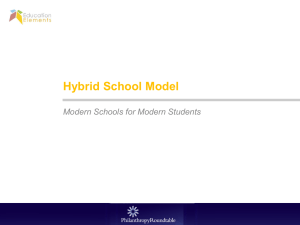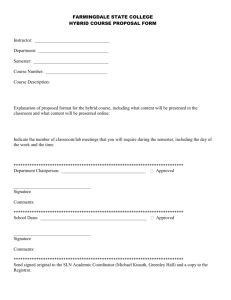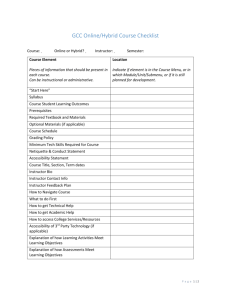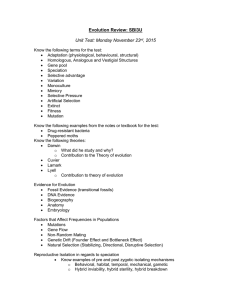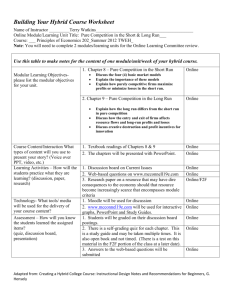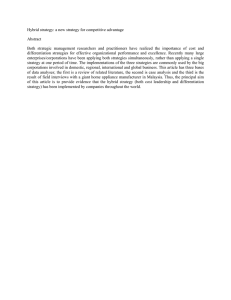Hybrid Proposal Introduction.doc
advertisement
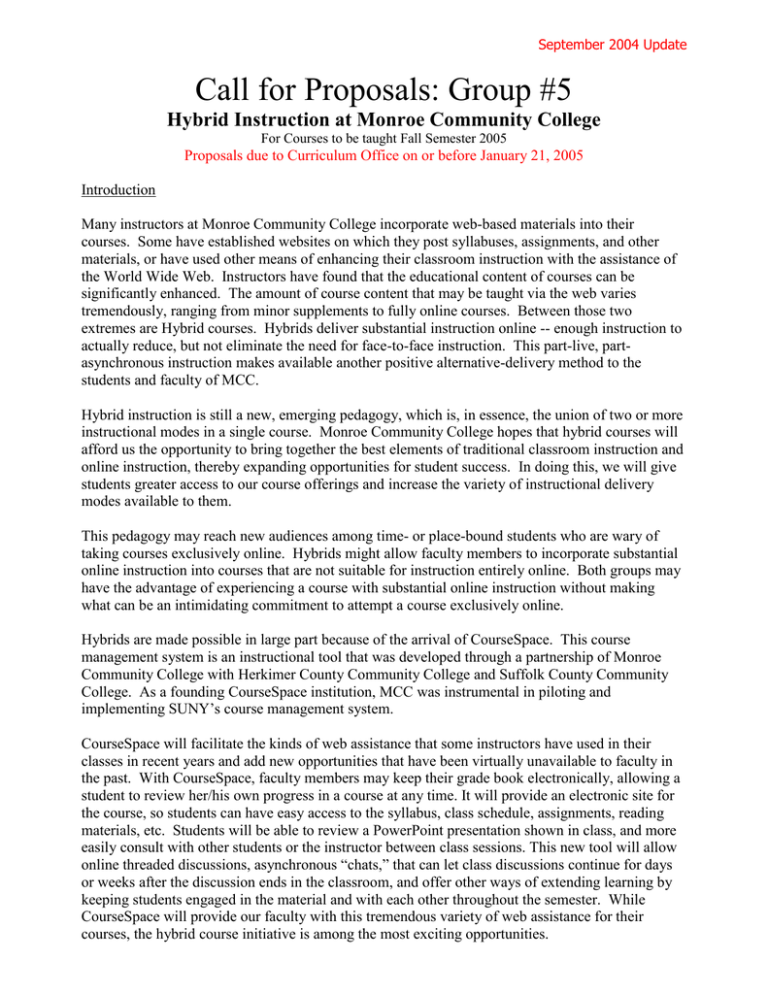
September 2004 Update Call for Proposals: Group #5 Hybrid Instruction at Monroe Community College For Courses to be taught Fall Semester 2005 Proposals due to Curriculum Office on or before January 21, 2005 Introduction Many instructors at Monroe Community College incorporate web-based materials into their courses. Some have established websites on which they post syllabuses, assignments, and other materials, or have used other means of enhancing their classroom instruction with the assistance of the World Wide Web. Instructors have found that the educational content of courses can be significantly enhanced. The amount of course content that may be taught via the web varies tremendously, ranging from minor supplements to fully online courses. Between those two extremes are Hybrid courses. Hybrids deliver substantial instruction online -- enough instruction to actually reduce, but not eliminate the need for face-to-face instruction. This part-live, partasynchronous instruction makes available another positive alternative-delivery method to the students and faculty of MCC. Hybrid instruction is still a new, emerging pedagogy, which is, in essence, the union of two or more instructional modes in a single course. Monroe Community College hopes that hybrid courses will afford us the opportunity to bring together the best elements of traditional classroom instruction and online instruction, thereby expanding opportunities for student success. In doing this, we will give students greater access to our course offerings and increase the variety of instructional delivery modes available to them. This pedagogy may reach new audiences among time- or place-bound students who are wary of taking courses exclusively online. Hybrids might allow faculty members to incorporate substantial online instruction into courses that are not suitable for instruction entirely online. Both groups may have the advantage of experiencing a course with substantial online instruction without making what can be an intimidating commitment to attempt a course exclusively online. Hybrids are made possible in large part because of the arrival of CourseSpace. This course management system is an instructional tool that was developed through a partnership of Monroe Community College with Herkimer County Community College and Suffolk County Community College. As a founding CourseSpace institution, MCC was instrumental in piloting and implementing SUNY’s course management system. CourseSpace will facilitate the kinds of web assistance that some instructors have used in their classes in recent years and add new opportunities that have been virtually unavailable to faculty in the past. With CourseSpace, faculty members may keep their grade book electronically, allowing a student to review her/his own progress in a course at any time. It will provide an electronic site for the course, so students can have easy access to the syllabus, class schedule, assignments, reading materials, etc. Students will be able to review a PowerPoint presentation shown in class, and more easily consult with other students or the instructor between class sessions. This new tool will allow online threaded discussions, asynchronous “chats,” that can let class discussions continue for days or weeks after the discussion ends in the classroom, and offer other ways of extending learning by keeping students engaged in the material and with each other throughout the semester. While CourseSpace will provide our faculty with this tremendous variety of web assistance for their courses, the hybrid course initiative is among the most exciting opportunities. September 2004 Update CourseSpace uses the same technologies as SLN for course development, allowing for course materials to easily be copied from one course database into another. Existing course documents (e.g. PowerPoint presentations, spreadsheets, word processing) can also be imported or attached within CourseSpace. Such features allow trained instructors to smoothly transition from an asynchronous or face-to-face environment into a hybrid environment. The Proposal MCC is completing a two-year pilot program in hybrid instruction. The pilot began with a group of five courses to be offered in the Fall semester 2003 and 10 courses in the Spring semester 2004. The pilot concludes with the new group of courses launched in Spring 2005. Hybrid courses offer an exceptional range of opportunities for instructional innovation. It is impossible for the college to effectively foresee and accommodate the entire universe of possibilities. While innovation is strongly encouraged and building the best possible instructional model is a goal of this initiative, we recognize that the pilot will have to be offered in a controlled environment in order to assure efficient operation of the institutional infrastructure while we learn about this new delivery system. For the purposes of the pilot, then, and into the early implementation of hybrid courses beyond the pilot, hybrids will be defined as being primarily online courses supplemented with face-to-face instruction. Synchronous instruction may be required of students as often as once per week, but may not constitute more than 50% of the instruction in the course. Notification to the college community that a course is a hybrid will be done as it is for online courses, with a unique course code. The following are guidelines for the initial delivery of hybrid courses at MCC. Participants Beginning with Group 5, all faculty are welcome to participate in the creation and delivery of hybrid courses at Monroe Community College. Training in the pedagogy should be arranged through the Curriculum Office and/or MCC’s CourseSpace Administrator no later than the semester prior to the due date for proposals. Classroom Use Hybrid courses may have as much as half of their contact hours assigned to a classroom, lab or other campus facility. The remaining instruction, which will constitute 50% or more of the course, will be taught online through CourseSpace. While the reduction in class sessions is a departure from the norm, face-to-face instruction sessions will, for the most part, follow existing classroom scheduling practices. For the initial offering, instructors will teach in 50- or 80-minute periods once per week. Innovative alternatives are encouraged, but instructors are cautioned that, due to the premium on classroom space at MCC, courses that meet for irregular time periods will be assigned space in off-peak hours. Room usage will be maximized by scheduling hybrid sections at the same hour in the same room on different days. Courses that have more than 50% of the contact hours in a campus facility will not be considered hybrid and therefore will be ineligible for reduced seat time. See the examples in the table on the following page. September 2004 Update Classroom assignment examples: Credit Hours Traditional Number of Class Hours Per Week 3 credit hours 3 class hours 3 credit hours 3 class hours 3 credit hours 3 class hours 4 credit hours 3 Lecture, 2 Lab hours For the Face-to-face portion of the Hybrid Course Faculty Choose: Room/Time Assignment One 50-minute class hour per week OR One 80-minute class hour per week Standard Irregular or variable instructional minutes each week Off-Peak More than 80 minutes each week throughout the semester Lab-only in campus facility; didactic taught through CourseSpace Not a hybrid; No reduction in Seat Time permitted Standard Lab Replacing Seat Time Course objectives must be met as effectively in hybrid sections of a course as they would be in any other instructional mode. Proposals for the creation of hybrid courses must include an explanation of how face-to-face faculty-student interaction will be effectively replaced with non-classroom instruction. Faculty-student interaction in the course should approximate the amount of engagement students would experience in either a traditional or an entirely online course. Assessment The achievement of course objectives and the success of our students are of paramount concern. We need to share the information in order to address issues and maximize benefits as we move forward. Careful assessment of this initiative will need to be made and therefore instructors will be asked to provide data and submit to more assessment administration (e.g. student surveys), than might be required in traditional course sections. Timeline Proposals Due to Curriculum Office Cohort 4 Cohort 5 Cohort 6 Cohort 7 (SLN/CSTrained Faculty) (SLN/CSTrained Faculty) (SLN/CSTrained Faculty) (SLN/CSTrained Faculty) 22-Apr-05 20-Jan-06 23-Apr-04 21-Jan-05 Proposals Reviewed by Advisory Committee On or Before On or Before 31-Jan-05 On or Before 29-Apr-05 On or Before 31-Jan-06 Recommendations Reviewed by ASLC Approved Cohort Announced ETS Workshops with full cohort On or Before 13-May-04 17-May-04 June On or Before 11-Feb-05 14-Feb-05 March/April On or Before 13-May-05 16-May-05 June On or Before 10-Feb-06 13-Feb-06 March/April One-on-one development work with instructional designers Deadline for Draft Submission of Course for Technical Review September – November May/June September – November May/June 1-Dec-04 30-Jun-05 2-Dec-05 30-Jun-06 3-Jan-05 Spring 2005 19-Aug-05 Fall 2005 6-Jan-06 Spring 2006 18-Aug-06 Fall 2006 Deadline for Final Submission of Course Hybrid Course Begins 30-April-04 September 2004 Update How to Initiate a Proposal to Develop a Hybrid Course Review and Approval Faculty members interested in offering an existing course in a hybrid format will apply for authorization using the form titled Proposals for Instructional Delivery in the Hybrid Format. As we emerge from the pilot period, we continue to suggest that new courses not be considered for delivery as a hybrid course. This form, which requires the signatures of the Department Chair and Divisional Dean, will be submitted, along with a course information sheet, a syllabus, and a detailed narrative to the Curriculum Office. Given that a key concern of those reviewing the proposals will be how face-to-face instruction will be replaced with high quality alternative instruction, the narrative should explain how the faculty-student interaction and student learning objectives will be maintained in the portion of the course using alternative instructional methods. The Curriculum Office will review the signed proposal and the Dean of Curriculum will notify the Academic Services Leadership Council that the proposal is under consideration. The Curriculum Office will forward the proposal to the Advisory Committee and the committee will recommend satisfactory proposals to the Vice President, Academic Services for approval. Hybrid Course Approval Process Existing Course* Prerequisite Initiate Initiation** Departmental Support Complete Proposal Form Document Review & Recommend Approval (Requirements vary based on instructor’s background) Divisional Dean Support (Signature denotes approval of Submit to Forwarded to Curriculum Office Program Advisory Committee plan to replace F2F) Committee Recommendations Reviewed by ASLC Vice President Academic Services * At this point, it is preferred that only existing courses be developed into hybrid sections. New courses should be taught in at least one other modality prior to launch as a hybrid. Proposals with strong reasons for making an exception to this rule will be entertained. ** Courses earmarked for development into hybrid courses may be initiated by faculty members/departments, the Advisory Committee or may be initially recommended by others in the campus community.
